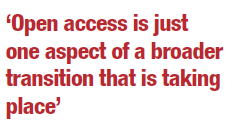Meeting considers how open access could address inequalities
Mark Patterson reports back from the COASP meeting that was held in Paris in September

In most previous years, the annual meeting of the Open Access Scholarly Publishers Association has taken place in eastern Europe. This year, however, the meeting moved west and was hosted at the UNESCO Headquarters in Paris in mid-September.
The collaboration with UNESCO is an indication of how far open-access publishing has come. Several of the contributions at the meeting also demonstrated where progress has been made, as well as the prospects for more radical developments in scholarly communication. But there’s still a long way to go.
The international dimension of open-access publishing, and its role in the post-2015 global development agenda, was highlighted in the opening remarks from Getachew Engida, deputy director general of UNESCO, and Indrajit Banerjee, director of UNESCO’s Knowledge Societies Division, who also emphasised UNESCO’s commitment to open access.
This theme was developed by Abel Packer of SciELO, who summarised the achievements of the SciELO journals platform in Latin America, where open access has reached impressive levels. For example, 27 per cent of Latin American articles indexed in Scopus are open access. Also at the meeting, Dominique Babini of CLACSO (Latin American Council of Social Sciences), Pierre de Villiers of AOSIS (African Online Scientific Information Systems) and Alwaleed Alkhaja of QScience covered developments in Argentina, South Africa, and the Middle East and north Africa respectively.
The range of talks and geographical locations emphasised the diversity of approaches to opening up scholarly communication. But it also identified some of the toughest challenges.
Foremost among those challenges are the predominant practices in research evaluation, which act as a powerful brake on change, and on open access specifically. The deficiencies in research evaluation based on journal brand and impact factors have been well documented. What might be less appreciated is that this predominantly ‘western’ approach has detrimental effects on publishing behaviour and scholarship in the global south. If national and regional journals struggle to gain entry into the key journal indices, those local journals have a hard time attracting scholars whose career advancement is tied to publication in ‘established’ journals that are run by editors in other parts of the world. Although no new solutions emerged, the view was expressed that scholars can help to break this vicious cycle.
Another strong theme at the meeting was innovation. New approaches in library-based publishing underscored the potential to collaborate between and within institutions. Alma Swan of SPARC Europe spoke about collaboration between libraries and the university presses, while Charles Watkinson of the USA’s University of Michigan described the Library Publishing Coalition, a community-led association founded recently in 2014.
The new programme at UCL in the UK, described at the meeting by Paul Ayris, was another good example. As he explained, the programme isn’t just tackling the challenging area of open-monograph publishing; it’s also forging ahead with open textbooks.
There are unexpected opportunities to be explored in these efforts too, so that more scholarship can be shared and used. For example, underserved constituencies such as undergraduate students can be brought into the scholarly-communication landscape and can learn through the experience of publishing in venues designed for their needs.
The topics at this year’s COASP meeting covered a range of formats and disciplines. Discussions were also not limited to texts. In the session on data, Celina Ramjoué of the European Commission gave an insight into policy development on data sharing in Europe. Meanwhile Phil Bourne (National Institutes of Health, USA) described his vision of a data commons, where research outputs are open and inter-connected, and transformed into a powerful platform for research and development.
Back down to earth, we heard about the nitty-gritty of open-access publishing. This included the progress that is being made towards the development of best practices in attribution, described by Caroline Sutton of Co-Action, and in the handling of article processing fees, discussed by Kai Karin Geschuhn of the Max Planck Society.
Perhaps the trickiest topic is how to negotiate the transition to open access if you begin as a subscription publisher. In the session on scholarly societies and publishing, different perspectives were presented. Andrea Baier summarised the challenges that the British Ecological Society is grappling with, specifically the high publication fees that would be required to preserve the current levels of income necessary to support the society’s other activities. By way of contrast, Xenia van Edig discussed how a number of societies are working with Copernicus Publications to move forward with open-access publishing supported by modest publication fees.
Finally, going back to the wake-up call to open-access publishers, Claudio Aspesi (Sanford Bernstein) presented a perspective on publishing through the lens of a financial analyst. Based in particular on the stock price trends of Reed Elsevier and Wiley, Aspesi’s conclusion is that the OA movement is having little, if any, impact on the traditional subscription-publishing world – evidence that open-access publishing is going west in more than one sense.
It’s hard to argue with the financial metrics that show that Reed Elsevier and others are doing very well. And I doubt that even the most ardent open-access advocate would argue that open access is advancing as well as they would like. However, the progress towards open access is undeniable, and as the final talk from ASAP Award (Accelerating Science Award Program sponsored by Google, PLOS and the Wellcome Trust) winner, Daniel Mietchen of Museum für Naturkunde, Berlin and many other presentations at the OASPA meeting demonstrated, open access is just one aspect of a broader transition that is taking place in scholarly communication.
Mark Patterson is executive director of eLife. He was also the chair of the organising committee for the 6th annual meeting of the Open Access Scholarly Publishers Association






